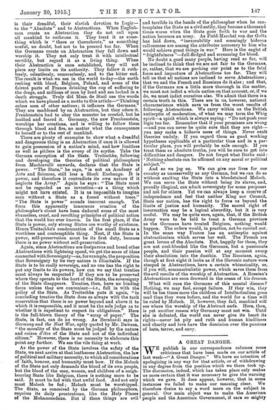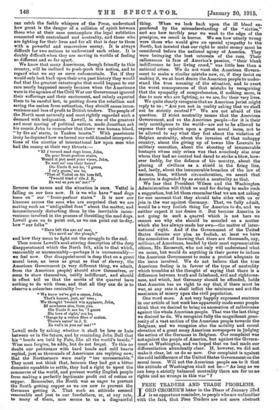A GREAT DANGER.
WP., publish in our correspondence columns some criticisms that have been made on our article of last week—" A Great Danger." We have no intention of apologizing in any way for that article, or of withdrawing in any degree from the position which we there took up. The discussion, indeed, which has taken place only makes us more certain that it was necessary to give the warning which we gave. It does appear, however, that in some instances we failed to make our meaning clear. We therefore desire to say a word more on the subject in general. Oar main object was to make the American people and the American Government, if ears so mighty tan catch the feeble whispers of the Press, understand how great is the danger of a collision of spirit between those who at their ease contemplate the legal subtleties connected with contraband and neutrality, and those who are fighting for their lives and for all that is dear to them with a powerful and remorseless enemy. It is always difficult for two nations to understand each other. It is doubly difficult when they are moving in worlds of feeling so different and so far apart.
We know that many Americans, though friendly to this country, will be inclined to pooh-pooh this notion, and to regard what we say as mere rodomontade. Yet if they would only look back upon their own past history they would find that the greatest catastrophe that could happen to our race nearly happened merely because when the Americans were in the agonies of the Civil War our Government. ignored their sufferings and their excitement, and calmly expected them to be careful lest, in putting down the rebellion and saving the nation from extinction, they should cause incon- venience and loss of profit to British traders. The people of the North most naturally and most rightly regarded such a demand with indignation. Lowell, in one of the greatest and most moving of political satires, made Jonathan ask his cousin John to remember that there was human blood, " by fits an' starts, in Yankee hearts." With passionate irony he depicted how we forced our cold-blooded interpreta- tions of the niceties of international law upon men who had the enemy at their very throats:— " F.f I turned mad dogs loose, Jahn,
On your front-parlour stairs, Would it jest meet your views, John, To wait an' sue their heirs P
Ole Uncle 8. sea he, ' I guess,
I on'y guess,' sex he, !That of Vattel on his toes fell, 'Twould kind o' rile J. B., Es wal es you an' me I' "
Reverse the names and the situation is ours. Mattel is falling on our toes now. It ie we who have "mad dogs loose on" our " front-parlour stairs." It is now our kinsmen across the seas who are surprised that we are making such an" undignified fuss" about the matter, and inconsiderately disturbing them by the inevitable incon- venience involved in the process of throttling the mad dogs. Lowell goes on to point out, as we can point out to-day, bow our folks"
"Have left the axe an' saw, The anvil an' the plough,"
and how they mean to fight out the struggle to the end.
Then comes Lowell's soul-stirring description of the deep disappointment which the North felt, akin to that which, reasonably or unreasonably—perhaps it is unreasonably— we feel now. Our disappointment is deep that on a great moral issue, an issue as great as that of slavery, the American Government (a very different thing, we admit, from the American people) should show themselves, or seem to show themselves, coldly indifferent, and should in effect tell us that the merits of the quarrel have nothing to do with them, and that all they can do is to observe a colourless neutrality !- " We know we've got a cause, John,
Thet's honest, just, an' true ;
We thought 'twould win applause, John, Ef nowhares else, from you.
Ole Uncle 8. see ho, I guess His love of right,' sea he,
'Hangs by a rotten fibre s' cotton.
There's eater' in J. B.
Es wars in you an' me!'"
Lowell ends by asking whether it shall be love or hate between us in the future, and by reminding John Bull that his " bonds are held by Fate, like all the world's beside." Wise men forgive, he adds, but do not forget. To this no doubt our politicians with bard heads and cold hearts replied, just as thousands of Americans are replying now, that the Northerners were really " too unreasonable." They must not think that, because they had got a bitter domestic squabble to settle, they bad a right to upset the commerce of the world, and prevent worthy English people from making a perfectly legitimate profit out of cotton or copper. Remember, the North was as eager to prevent the South getting copper as we are now to prevent the Germane getting it. That such an attitude seemed reasonable and just to our forefathers, or, at any rate, to many of them, now seems to us a disgraceful thing. When we look back upon the ill blood en- gendered by the misunderstanding of the "sixties," and see how terribly near we went to the edge of the precipice, we recoil in horror. We see how utterly wrong were those who would give no special sympathy to the North, but insisted that our right to make money must be considered before the national agony of America. They were betraying the best interests of the race. Their callousness in face of America's passion, "their blank indifference to her living creed," was little less than a national crime. We do not want the American Govern- ment to make a similar mistake now, or, if they insist on making it, we at least desire the American people to under- stand the true meaning of the situation, and to avert the worst consequences of that mistake by recognizing that the sympathy of comprehension, if nothing more, is due to men who are fighting, as we are, for their very lives. We quite clearly recognize that an American jurist might reply to us " Are you not in reality asking that we shall not be strictly neutral ?" We are not afraid of the question. If strict neutrality means that the American Government, and so the American people—for it is their only mouthpiece to the world--are not to be allowed to express their opinion upon a great moral issue, not to be allowed to say what they feel about the violation of Belgian neutrality, about the invasion of that unhappy country, about the giving up of towns like Louvain to military execution, about the shooting of innumerable hostages whose only crime was that somebody else over whom they had no control had dared to strike a blow, how- ever feebly, for the defence of his country, about the placing of civilians as a shield in the firing line, and, lastly, about the innumerable breaches of the law of nations, then, without circumlocution, we assert that America is degraded 197 so strict a neutrality as that. We fear that President Wilson and the Washington Administration will think us mad for daring to make such a suggestion, but iet them remember that we are not asking for one moment that they should take sides with us or join in the war against Germany. That, we fully admit, would be a very foolish thing for America to do, and we neither expect it nor desire it. But because America is not going to seek a quarrel which is not hers we cannot see why she should be muzzled on a matter which she has always made her own—the matter of inter- national right. And if the Government of the "United States dismiss our plea as foolish, at least we have the consolation of knowing that there are thousands, nay, millions, of Americans, headed by their most representative citizen, Mr. Roosevelt, who not only will understand what we mean, but would do anything in their power to induce the American Government to make a protest adequate to the issue involved. We do not believe that the true American feeling is in favour of the type of neutrality which trembles at the thought of saying that there is a difference between truth and falsehood, evil and righteous- nese, and which, lest Germany should be offended, holds that America has no right to say that, if them must he war, at any rate it shall inflict the minimum and not the maximum of misery upon the civil population.
One word more. A not very happily expressed sentence in our article of last week has apparently made some people think that we desired to bring an accusation of callousness against the whole American people. That was the last thing we desired to do. We recognize fully the magnificent gene- rosity of a vast section of the American people towards the Belgians, and we recognize also the nobility and moral elevation of a great many American newspapers in judging the action of the Germans in Belgium. Our complaint was not against the people of America, but against the Govern- ment at Washington, and we hoped that we had made our differentiation abundantly clear. If, however, we did not make it clear, let us do so now. Our complaint is against the cold indifference of the United States Government on the moral issue. Will not the American people see to it that the attitude of Washington shall not be—" As long as we can keep a strictly balanced neutrality there are for us no rights and no wrongs in this war " ?



















































 Previous page
Previous page